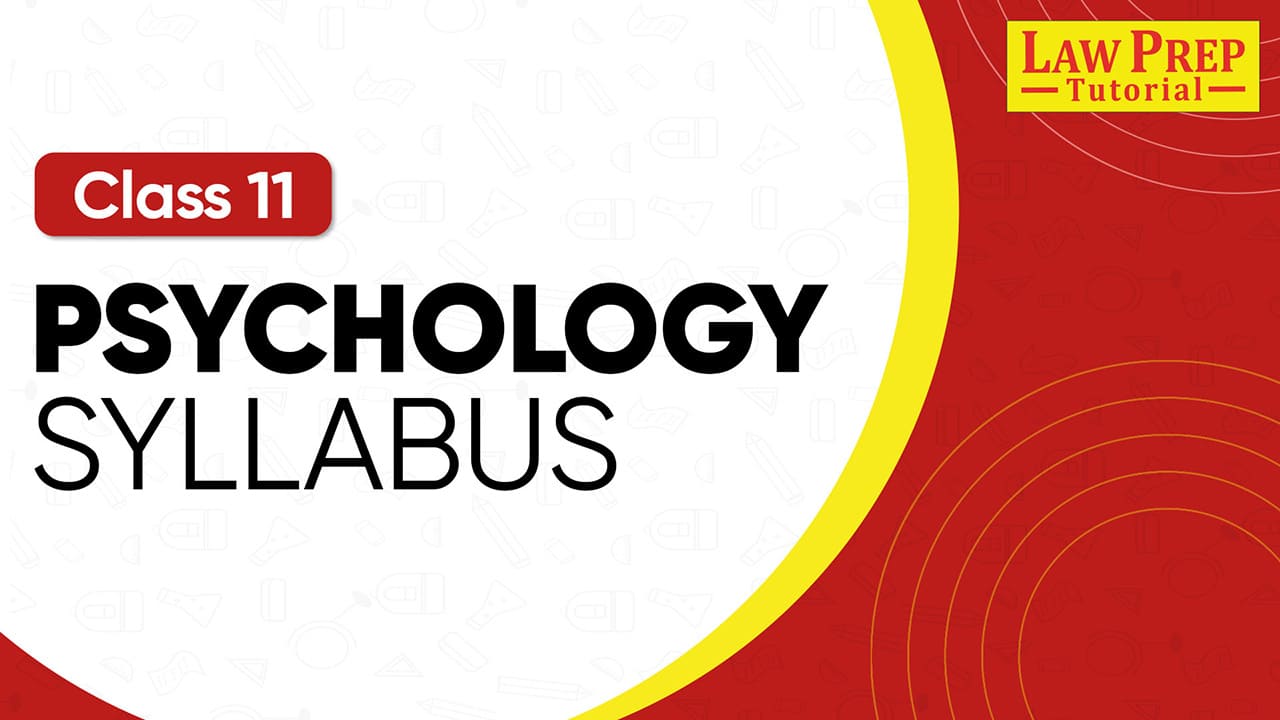The Class 11 Psychology syllabus 2026-27 is designed to help students explore the fascinating world of human mind and behavior. It introduces concepts like learning, memory, perception, development, motivation, and emotion, while also familiarizing learners with methods of psychological enquiry.
The syllabus of psychology for class 11th CBSE not only strengthens theoretical knowledge but also emphasizes practical applications through case studies and experiments.
By studying this subject, you will develop analytical and observational skills that are valuable for higher studies in psychology, social sciences, and even professional fields like education, counseling, and health care.
Class 11 Psychology Syllabus 2026-27: Overview
Find the overview of class XI psychology syllabus for CBSE and NCERT:
| Units | Unit Name | Marks |
| I | Understanding Psychology | 11 |
| II | Methods of Enquiry in Psychology | 13 |
| III | Human Development | 11 |
| IV | Sensory, Attentional and Perceptual Processes | 8 |
| V | Learning | 9 |
| VI | Human Memory | 8 |
| VII | Thinking | 5 |
| VIII | Motivation and Emotion | 5 |
| Total (Theory) | 70 | |
| Practical / Project Work | 30 | |
| Grand Total | 100 |
📥 Download Class 11 Psychology Syllabus PDF
Download the official Class 11 Psychology Syllabus PDF 2026-27 here.
Class 11 Psychology Syllabus 2026-27
Let’s discuss in detail the syllabus of class 11th psychology:
| Units | Topics |
| Unit I: Understanding Psychology | 1. Introduction 2. Nature of Psychology: Psychology as a Discipline, Psychology as a Natural Science, Psychology as a Social Science 3. Understanding Mind and Behaviour 4. Popular Notions about Psychology 5. Evolution of Psychology 6. Development of Psychology in India 7. Branches of Psychology 8. Psychology and Other Disciplines 9. Psychology in Everyday Life |
| Unit II: Methods of Enquiry in Psychology | 1. Introduction 2. Goals of Psychological Enquiry: Steps in Conducting Scientific Research, Alternative Paradigms of Research 3. Nature of Psychological Data 4. Methods: Observational, Experimental, Correlational, Survey, Psychological Testing, Case Study 5. Analysis of Data: Quantitative & Qualitative 6. Limitations of Psychological Enquiry 7. Ethical Issues |
| Unit III: Human Development | 1. Introduction 2. Meaning of Development: Life-Span Perspective 3. Factors Influencing Development 4. Context of Development 5. Overview of Stages: Prenatal, Infancy, Childhood, Adolescence, Adulthood & Old Age |
| Unit IV: Sensory, Attentional and Perceptual Processes | 1. Introduction 2. Knowing the World 3. Nature and Varieties of Stimulus 4. Sense Modalities & Functional Limitations 5. Attentional Processes: Selective & Sustained 6. Perceptual Processes: Processing Approaches 7. The Perceiver8. Principles of Perceptual Organisation 9. Perception of Space, Depth & Distance (Monocular & Binocular Cues) 10. Perceptual Constancies 11. Illusions 12. Socio-Cultural Influences on Perception |
| Unit V: Learning | 1. Introduction 2. Nature of Learning 3. Paradigms of Learning 4. Classical Conditioning & Determinants 5. Operant/Instrumental Conditioning: Determinants & Key Processes 6. Observational Learning 7. Cognitive Learning8. Verbal Learning 9. Skill Learning 10. Factors Facilitating Learning 11. Learning Disabilities |
| Unit VI: Human Memory | 1. Introduction 2. Nature of Memory 3. Information Processing Approach: Stage Model 4. Memory Systems: Sensory, Short-term & Long-term 5. Levels of Processing 6. Types of Long-term Memory: Declarative, Procedural, Episodic, Semantic 7. Nature & Causes of Forgetting: Trace Decay, Interference, Retrieval Failure 8. Enhancing Memory: Mnemonics using Images & Organisation |
| Unit VII: Thinking | 1. Introduction 2. Nature of Thinking 3. Building Blocks of Thought 4. Processes of Thinking 5. Problem Solving6. Reasoning 7. Decision-making 8. Creative Thinking: Nature & Strategies 9. Thought and Language 10. Development of Language & Language Use |
| Unit VIII: Motivation and Emotion | 1. Introduction 2. Nature of Motivation 3. Types of Motives: Biological & Psychosocial 4. Maslow’s Hierarchy of Needs 5. Nature of Emotions 6. Expression of Emotions: Cultural & Emotional Expression, Emotional Labeling 7. Managing Negative Emotions 8. Enhancing Positive Emotions |
More Important Resources for CBSE Exam:
| Class 11th Hornbill Syllabus | CBSE Class 11th Commerce Subjects |
| CBSE Full Form | All about CBSE Class 11th |
| Class 11th Syllabus | Class 12th Syllabus |
| Class 11th Commerce Books | CBSE Board: All details |
CBSE Class 11th Psychology Syllabus: Practical Work
| S. No. | Practical Work Components | Marks |
| 1 | Practical File (5 experiments based on the units taught) | 10 |
| 2 | Case Profile (detailed report of an individual including personal, family, and social background with psychological insights) | 4 |
| 3 | Practical Examination (Conducting one experiment & viva based on it) | 5 |
| 4 | Viva Voce (Questions on practicals, case studies, and the subject) | 6 |
| 5 | Project Work (One project related to psychology in everyday life) | 5 |
| Total | 30 |
CBSE Class 11th Psychology Syllabus: Question Paper Design
| Typology of Questions | Learning Objectives | Marks | Weightage |
| Remembering & Understanding | Recall, demonstrate understanding of facts, terms, concepts, and principles. | 17 | 24% |
| Applying | Apply concepts, principles, and psychological theories in real-life situations or problems. | 19 | 27% |
| Analysing, Evaluating & Creating | Examine information, interpret, infer, analyze, evaluate evidence, and construct logical arguments. | 24 | 34% |
| Map/Diagram/Case-based/Skills | Interpret psychological data, solve case-based problems, apply diagrams/flowcharts. | 10 | 15% |
| Total | 70 | 100% |
Objectives of Class 11 Psychology Syllabus 2026-27
The Class 11 psychology course has been framed to help learners build both theoretical knowledge and practical understanding of human behavior. Its objectives are:
- To introduce psychology as a scientific study of mind and behavior, breaking common myths about the subject.
- To help students understand growth, development, learning, memory, thinking, motivation, and emotions across the lifespan.
- To train students in basic research methods like observation, experimentation, and case studies, along with ethical practices.
- To encourage learners to apply psychological principles to real-life situations in education, family, health, workplace, and society.
- To build critical and analytical thinking skills, so students can evaluate human behavior logically.
- To improve self-awareness and interpersonal understanding, enabling better adjustment in personal and social life.
- To develop skills of data collection, analysis, and interpretation that prepare students for higher studies in psychology and related fields.
- To foster a balanced perspective by integrating biological, cognitive, and socio-cultural factors of human behavior.
- To promote empathy, tolerance, and appreciation of individual differences in thoughts, emotions, and actions.
- To encourage learners to use psychology for personal growth and social well-being.
Check the latest CBSE Class 11 syllabus for all subjects below:
Tips to Prepare for CBSE Class 11th Psychology Syllabus
- Start with NCERT: Every question in the exam is based on NCERT, so read the book line by line and highlight key definitions, examples, and case studies.
- Create Visual Notes: Convert long explanations into flowcharts, tables, and mind maps to make recall easier, especially for processes like memory, perception, and learning.
- Practice Real-Life Applications: Try linking theories with your daily life. For example, observe how attention works in a noisy classroom or how motivation affects study habits.
- Use Keywords Wisely: Psychology answers are evaluated on the use of proper terms. Make a glossary of important concepts and revise it regularly.
- Focus on Practical File & Project: Since practicals carry 30 marks, prepare your case profile, experiments, and viva questions thoroughly.
- Solve Sample Papers: Attempt previous year and sample question papers to get a feel of the exam pattern and improve time management.
- Revise Regularly: Short, consistent revisions are more effective than last-minute cramming. Keep 15 minutes daily for quick recap.
- Group Discussions: Studying with friends and discussing topics like emotions, stress, or learning styles can help you understand concepts deeply.
Suggested Project Topics for CBSE 11th Psychology Syllabus
As part of the practical work, every student is required to complete one project or small study and conduct two experiments. Projects can be based on surveys, case studies, interviews, or observations. Here are some interesting and relevant topics you can choose from:
- Bullying and Cyberbullying: Explore how peer behavior in schools and online platforms affects students’ self-esteem and learning.
- Mental Health and Wellbeing: Study the role of stress management, self-care, and coping strategies in maintaining mental health.
- Impact of Social Media on Youth: Investigate how platforms like Instagram or YouTube influence study habits, confidence, and relationships.
- Altruism and Wellbeing: Research how helping behavior (like volunteering or peer support) impacts emotional health and satisfaction.
- Peer Pressure: Understand how students are influenced by friends in areas like academics, lifestyle, or decision-making.
- Anger Management: Study techniques young people use to control anger and how it affects their relationships.
- Sleep Hygiene: Analyze the connection between sleep patterns, memory, and academic performance among teenagers.
- Changing Gender Roles and Stereotypes: Observe how views on gender equality and responsibilities are evolving in schools and society.
- Cooperation vs. Competition: Compare the effects of working in groups versus competing individually on performance and motivation.
- Compliance and Obedience: Study how students respond to authority figures like teachers and parents in different situations.
Prescribed Book for CBSE Class 11 Psychology Syllabus
Psychology – Class XI, NCERT Publication
This NCERT textbook is the official and prescribed book for Class 11. All chapters, exam questions, and practical references are based on this book. Students must follow it thoroughly for board preparation.
Read the chapter-wise summaries of Class 11 English here:
FAQs About Class 11 Psychology Syllabus
There are a total of 8 units in the theory part.
No, psychology is interesting if studied regularly. With examples and NCERT focus, it is manageable.
The NCERT Psychology textbook for Class 11.
Students perform 5 experiments, prepare a case profile, complete project work, and give viva voce.
Short answer, long answer, and case-based questions from NCERT.
Yes, it builds a foundation for careers in counseling, education, healthcare, HR, and research.
Yes, flowcharts and diagrams can make answers more presentable and easy to revise.
Find detailed questions and answers from all chapters of English Class 11 now:
Explore the updated CBSE Class 12 syllabus for all subjects here:
Discover CLAT exam resources that can help you get started early:
Explore CLAT coaching centers across different cities:


